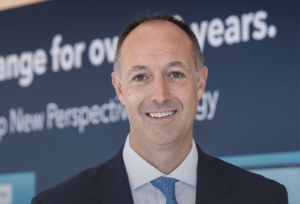Chris Miles, Head of Financial Intermediaries UK, Capital Group

While change is the norm in the global economy, what is particularly unique and exciting for investors about current times is that there appears to be a confluence of several transformational and multi-generational shifts. According to research[1] we have conducted, 60% of UK intermediaries agree that a series of megatrends are shaping the global economy. Looking forward, we expect these powerful forces to drive a much richer, more diverse set of investment opportunities over the next decade and beyond.
Disruptive force of Artificial Intelligence (AI)
While we still expect continued strong growth from companies offering scalable internet platforms, cloud computing and software, the next significant digital progression could potentially emerge from mass adoption and commercialisation of AI. In fact, 71% of intermediaries consider AI as the top investment opportunity for the next 12 to 24 months.
Our AI investment framework focuses on the following areas: compute (semiconductors, or the ‘brains’ of AI), infrastructure (cloud hyper-scalers, data centres and networks, which provide the ‘plumbing’), AI model developers, software applications (embedding valued-added AI into software and charging a recurring premium), and finally thereal-life and end-industry beneficiaries.
Most of the current hype is around two of these areas: real-life and end-industry beneficiaries, and AI model developers. However, we currently see fewer long-term investment opportunities within these spaces. As for AI model developers, we are wary of potential commonization given a large and growing open-source AI community advocating the ‘AI for Humanity’ concept.
In contrast, we see potential long-term opportunities in companies providing the computational processing power and the infrastructure on which most AI workloads will run. We also see potential in software businesses that can successfully embed a value-added AI application into their systems and charge a recurring premium.
As investors, one of the most attractive features of AI is that its ultimate addressable market is potentially limitless, given its pervasiveness across almost every part of the economy. However, it remains crucial to separate short-term hype from longer-term investment opportunity.
‘Third wave’ of healthcare innovation
Health care analysts at Capital Group believe we are entering a golden era of medical innovation, driven by a substantial increase in the number of novel drug platforms, which is expected to accelerate the pace of drug innovation and discovery. However, this megatrend might be overlooked as an investment opportunity as only 9% of UK intermediaries consider it a top choice for the next 12-24 months.
Following the first wave of innovation (which was largely about chemistry) and the second wave (moving from inorganic chemistry to organic), we are now at the beginning of the third wave − the genetic era – which could be transformative. Breakthroughs are enabling a deeper understanding of genetics and leading to the creation of highly targeted, interventions to tackle a wide range of genetic disorders. Examples of these treatments include RNA interference (RNAi), gene therapy and gene editing.
RNAi allows doctors to correct ‘mistakes’ in the genetic code, finding a defect and effectively silencing it. Gene therapy, meanwhile, transplants ‘normal’ genes in place of missing or defective ones to address a disease, and gene editing involves precise manipulation of a specific sequence of the genome.
Industrial renaissance
We are at the confluence of a variety of multi-year trends which are setting the stage for an ‘industrial renaissance’. The reconfiguration of supply chains as companies seek to mitigate geopolitical risk, rising defence expenditure, data centre infrastructure, and a renewed focus on energy security are all setting the stage for an industrial capex super cycle.
Perhaps most pertinent of all is the role of the energy transition. Addressing the climate emergency is likely to be the definitive objective of our generation − and it will be expensive. According to Bloomberg NEF, annual global investment needs to reach over £3.3 trillion/US$4.3 trillion per year by 2030[2], to stay on track for 2050 Net Zero, a sixfold increase from 2021 levels.
Growth in renewable energy has been a major investment theme for at least a decade due to declining costs, and governments’ commitment of trillions towards infrastructure buildout. These taxes and incentives provide funding to electrify power grids, build high voltage transmission lines, and mine the rare minerals needed to manufacture batteries for storing variable and intermittent energy sources like wind and solar. This is likely to generate demand for a range of electrical equipment makers, as well as industrial conglomerates and developers of advanced battery energy storage systems.
While the initial energy transition focus has been on areas like electric vehicles, less visible but equally critical changes include better air-conditioning hardware, as well as more efficient methods of heating buildings, given they account for around 40% of greenhouse gas emissions[3]. Elsewhere, alternative fuels such as hydrogen will play an important role where electrification could be challenging, such as long-haul trucking or steel making.
Opportunities offered by multinational companies
A cohort of companies that have proved particularly effective in responding to an unpredictable environment are multinationals, with such global businesses typically well equipped to deal with uncertainty and disruption. For the most part, they have strong and experienced management teams, capable of navigating different − even hostile − environments. These are some of the reasons why within equities, multinational companies are viewed by 71% of UK intermediaries as offering strong growth prospects over the coming decades.
It is clear, then, that the next decade and beyond could present a rich and more diverse set of investment opportunities versus the previous decade. But that also means it is important to find investment strategies that can navigate significant market shifts, while keeping true to their objectives and philosophy.
For UK investors looking to access these multinationals and the megatrends driving growth over the coming years, Capital Group’s New Perspectives Fund offers a time-tested strategy, having navigated various market cycles for over 50 years, and was recently launched as an OEIC in the UK market.
[1] An online survey consisting of both quantitative and qualitative interviews was conducted with 205 professional investors, all of whom are retail intermediaries. The participants included 128 Investment Advisers (IAs) and 77 Discretionary Fund Managers (DFMs). Fieldwork was carried out from 4th July to 15th July 2024.
[2] Source: UN, as at October 2022
[3] According to the United Nations Environment Programme (UNEP), buildings account for approximately 40% of global greenhouse gas emissions (and 25% of water consumption)
Main image: isis-franca-hsPFuudRg5I-unsplash































